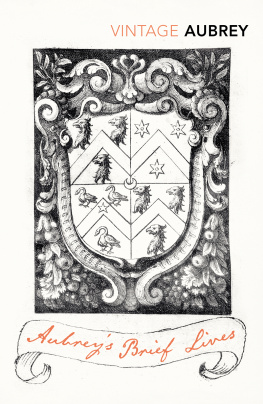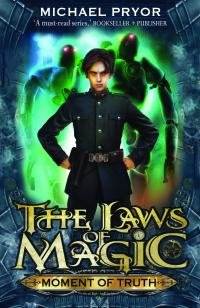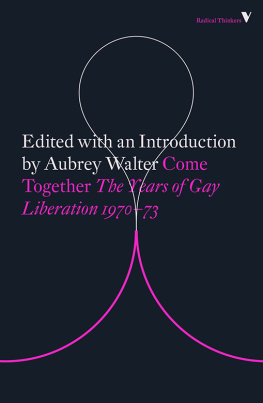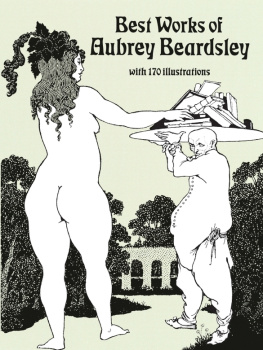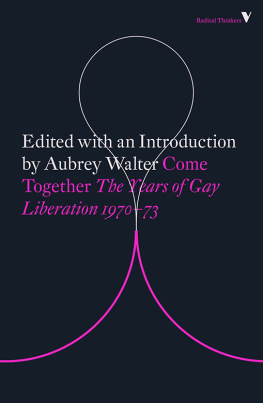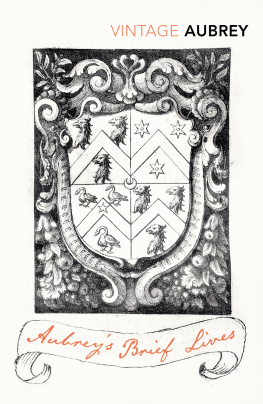CONTENTS
Introduction
All lives, even the long-lived, are brief when measured against the march of time. John Aubrey (162697) congratulated himself on coming from a longaevous race. He believed that antiquaries, like poets, are born and not made: some people, in every generation, are naturally drawn towards treasuring the past and salvaging what they can of it for posterity.
Aubreys life coincided with the most tumultuous social and constitutional crises England has experienced yet. He was born a gentleman in Wiltshire. He lived through Englands Civil War, which began in 1642 while he was a student at Oxford. He was twenty-two when Charles I was executed. He saw Oliver Cromwells rise to power as Lord Protector of the Commonwealth of England, and Richard Cromwells brief succession. He witnessed the Restoration of Charles II, the short reign of James II, who lost his throne in 1688, and the Glorious Revolution that replaced him with William of Orange and his wife Mary, daughter of James II. Aubrey died in 1697, ten years before England and Scotland joined their parliaments to create the United Kingdom of Great Britain.
Aubrey was seventy-one when he died: a decent age to have reached in the 17th century and today. Like all of us fortunate not to be taken in youth, he became more concerned about the brevity of life as he aged. He began to consider that we are all mortal men, and that we must not lose TIME.
The story of the collaboration between Aubrey and Wood is at the heart of Brief Lives. They first met in Oxford in 1667 when Aubrey was browsing books on a booksellers stand outside All Souls College. He came across William Fulmans history of Oxford University, Notitia Academiae Oxoniensis (1665), and was mistakenly told the author was Anthony Wood who could be found in Merton College. Aubrey sought Wood out and they talked about their shared passion for antiquities in the Meremaid Tavern. Wood was six years younger than Aubrey, but both had witnessed the destruction of war-torn England: the old buildings, monuments and manuscripts wantonly destroyed by Puritan fanatics. Aubrey offered to help Wood collect information for the book he had been researching for the last six years on the history of Oxford. Until Woods death in 1695, aged sixty-two, they exchanged letters, manuscripts, books and a wealth of biographical information about their contemporaries and predecessors. Wood would send Aubrey lists of Wikipedia-type questions: Where was so-and-so born? When did he die? Where is he buried? What books and pamphlets did he write? And Aubrey would find the answers.
United by their love of antiquities, Aubrey and Wood were very different men. Aubrey had a genius for friendship and a vast circle of acquaintance which included wealthy patrons, like the Pembroke family; early founders of the Royal Society, like Robert Hooke and Robert Boyle; distinguished writers, painters, architects, statesmen, politicians, lawyers, bishops, booksellers, tradesmen, shopkeepers etc. Aubrey seems to have had the ability to make friends with anyone and everyone. Wood, in contrast, was irascible and reclusive; he seldom left Oxford. He fell out even with his closest relatives, even with Aubrey. And yet their friendship endured for three decades. Wood brooding and obsessively working at the centre of the city of learning represented something of irreplaceable value to Aubrey: a still point in this fleeting world. Aubrey saw Wood as a candid historian, to whom worldly fripperies money, sex, power meant nothing, whose only concern was the truth.
Aubrey modestly hoped that the help he was giving Wood would earn him an acknowledgement in print and in this way his name would live on after his death like an unprofitable elder or ewe-tree on some noble structure.
Aubrey did not envisage that his Brief Lives would be published certainly not in his lifetime, almost certainly never. He thought he was compiling an archive in which future generations would be able to find valuable information that would otherwise be lost. He did not presume to know what use posterity might make of the biographical remnants he salvaged. He was concerned with accuracy like a scrupulous modern-day journalist, but he was also patiently insistent that controversial components of his work should not be cited until after his death. Aubrey thought that some of what he had written and shared with Wood was unsuitable for publication until the author and his subjects were rotten in the ground, like medlars. There were things he had written that he feared could cut his throat. With his eye fixed on the future, he tried to steer a steady path between gathering information, which might turn out to be the sometimes scurrilous source of truth, and due respect for the damage gossip can do.
For all his caution, Aubrey became embroiled in a scandal when Wood printed a story he had sent him about the Earl of Clarendon accepting bribes under the Restoration. Clarendons son prosecuted Wood and the offending pages were publicly burnt. Wood was fined 40 and temporarily expelled from the university in July 1693. The friendship between Aubrey and Wood was almost destroyed, caught, as many subsequent friendships have been, in the crosscurrents of hearsay, truth and print. Aubrey had entrusted his manuscripts to Wood, who destroyed forty-four pages of the second of the three volumes of Brief Lives. Aubrey wrote, I thought you so deare a friend that I might have entrusted my life in your hands: and now your unkindenes doth almost break my heart.
The Brief Lives are mostly lives of seventeenth-century men: eminent writers, philosophers, mathematicians, scientists, doctors, astrologers, soldiers, sailors, lawyers, dignitaries of the state and the Church of England. There are a few female lives that command their own biography: women married to or fathered by famous men, outstandingly beautiful, or simply wondrous wanton. And there are many more ordinary or unnamed women, caught between the lines mothers, sisters, wives, daughters, mistresses, whores. Theirs are lives lived amidst the intense social turmoil of civil war, the Great Plague and the Great Fire of London. They encompass discoveries that changed the future, such as the circulation of blood, and magical spells and folklore from the distant past. Aubrey was proud of the fact that he did not disdain to learn from ignorant old women. When he was seeking information to pass on to the future about eminent men, it was often womens voices and experiences he recorded.
Generous almost to a fault towards his wide circle of scholarly friends, Aubrey was an unusually self-effacing person. He saw himself as a whetstone for other peoples talents, doubted the power of his own mind, doubted even the quality of his distinctive prose, and claimed gratitude to others as his own greatest virtue. In one respect, however, he was completely confident of making an important and original historical contribution he knew he was inventing the modern genre of biography. He cursed the classical tradition of high-style panegyrics and selective eulogies: Pox take your orators and poets, they spoile lives & histories.
He was right. The fine details Aubrey recorded are essential for the study of his subjects and a spur to subsequent biographers. The detail that the philosopher Hobbes, when young, had such black hair his schoolmates called him Crow is irrelevant to his theory of the State, but delightful to know. The fact that Sir Walter Raleigh spoke to his dying day with a broad Devonshire accent is trivial, but potent enough to change for ever our image of the famous courtier. Aubrey specialised in such rich details, he knew they would be lost if he did not collect them. The words according to Aubrey or Aubrey says resound down the centuries to the present day, where they still appear in the introductions to new books on Thomas Hobbes, John Milton, Isaac Newton and Christopher Wren. He wanted to get at the truth: the naked and plaine trueth, which is here exposed so bare that the very pudenda are not covered, and affords many passages that would raise a blush in a young virgins cheeke.

